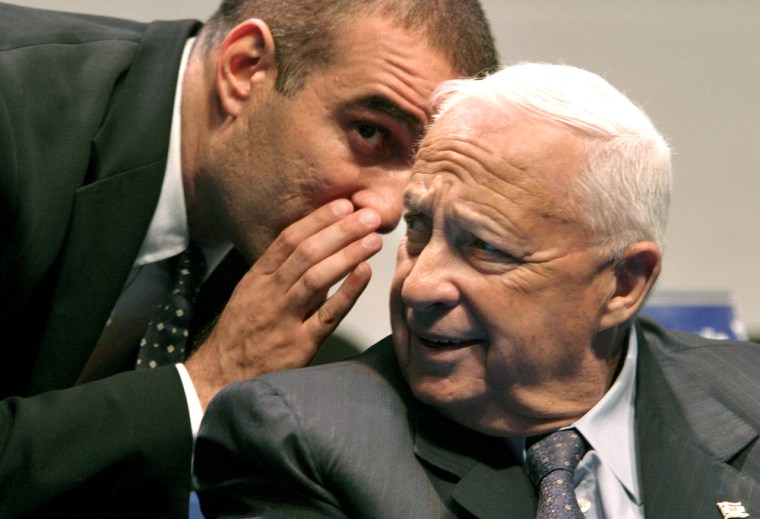The Bush administration has signaled approval of growth in some Israeli settlements in the West Bank in a policy change aimed at helping Prime Minister Ariel Sharon, the New York Times reported Saturday.
The paper quoted unnamed officials as saying the administration now supported construction of new homes in some settlements as long as the expansion does not extend into undeveloped parts of the occupied territory.
Until now the U.S. position has been that all settlement activity should be frozen.
The Times said the new policy emerged this week when Washington officials failed to criticize an Israeli announcement that 1,000 building tenders would be issued for subsidized apartments for settlers.
The building announcement appeared to be an attempt to defuse resistance from rebels in Sharon’s Likud party angered by a bid to bring the center-left opposition Labor party into government to boost the prime minister’s Gaza pullout plan.
But it failed, and the party dealt Sharon a humiliating rebuff on Wednesday.
The plan to quit the Gaza Strip and uproot 21 Jewish settlements there, along with four others in the West Bank, is strongly opposed by the Likud settler lobby that says the withdrawal is tantamount to “rewarding Palestinian terrorism.”
The paper quoted a Bush administration official as saying Washington had decided not to compound Sharon’s political troubles at a time when he was battling hard-liners.
“Some American officials acknowledged, in addition, that President Bush was reluctant to criticize Israel during his re-election campaign, which is counting on support from conservative supporters of Israel,” the paper reported.
Gaza violence
Daily violence continues in Gaza as Israel seeks to put down militants before implementing Sharon's withdrawal plan to ensure the pullout is not seen as a victory for the gunmen.
On Saturday, Israeli soldiers shot and killed a Palestinian as he approached a security fence between Israel and the Gaza Strip, Israeli military sources told Reuters.
The sources said the Palestinian was shot on Friday night in an area off-limits to Palestinians and his body discovered on Saturday. They said an explosive device was found next to the body.
Palestinians could not immediately identify the dead man but medics confirmed his body was transferred to a Gaza hospital.
Meanwhile, Israeli leaders faced increased internal pressure on Friday to reassess its West Bank security barrier.
Attorney General Meni Mazuz warned Thursday that a ruling in July in which the International Court of Justice urged Israel to tear down the barrier could lead to sanctions against Israel.
Mazuz’s warning — an unusual acknowledgment that the country could be punished because of its policies toward the Palestinians — coincided with a Supreme Court order giving the government 30 days to produce a statement about how the World Court’s decision would affect the barrier’s construction.
A senior Israeli official told The Associated Press on condition of anonymity that Israel would stick to its decision not to comply with the ruling by the Hague, heeding only the rulings of the Israeli court.
However, the official said, in order to head off the possibility of sanctions, “Israel must be ready from a legal point of view to provide answers why it is not implementing the Hague decision.”
The official’s comment reflected growing international pressure on Israel on the barrier issue.
The serpentine complex of concrete walls, razor wire and trenches has already disrupted the lives of thousands of Palestinians, who have been cut off from their lands and prevented from reaching other villages and population centers.
Israel says it is necessary to prevent Palestinian militants from attacking its towns and cities.
Ruling squeezes government
A precedent-setting Supreme Court ruling in June has led the Defense Ministry to reroute chunks of the barrier to bring it closer to Israel’s 1967 boundary.
The court ordered a 20-mile section of the barrier rerouted, saying it violated Palestinian human rights and international law. That section of the planned 425-mile structure was to jut deep into the West Bank, on lands Palestinians want for a future state.
Mazuz’s report could force the government to make still more changes.
“We are on solid ground on Jerusalem, but we are on more shaky ground in some rural areas,” said the Israeli official, who asked that his name not be used.
Since Israel captured the West Bank in the 1967 Mideast War, Israeli leaders have consistently refused demands from the powerful Jewish settlement movement to declare sovereignty over the territory, fearing international condemnation and the end of a Jewish majority in the country.
But the decision by Sharon, the prime minister, to move forward with construction of the barrier along a route that wold put significant swaths of West Bank land on the “Israeli” side raised a firestorm of criticism worldwide, which climaxed with the Hague decision.
In his report, Mazuz said the government should “as quickly as possible have its decisions regarding the barrier’s route ... comply with the principles set down by the Supreme Court.”
Mazuz advised Sharon to have his Cabinet officially adopt the Defense Ministry’s new route. “Such a decision will send the message that Israel is respecting international law in construction of the separation barrier,” he said.
Under Sharon’s plan for “unilateral disengagement,” Israel would complete the barrier and withdraw from the Gaza Strip and four West Bank settlements by the end of 2005.
About one-fourth of the barrier has been built.
Although the World Court ruling and a U.N. General Assembly resolution backing the decision are not legally binding, Mazuz said, “it is difficult to minimize the negative repercussions of the Hague court’s decision on the state of Israel.”
“The decision creates a new legal reality for Israel in the international arena that can be used as an excuse or catalyst to take different actions against Israel ... including sanctions,” he wrote.
